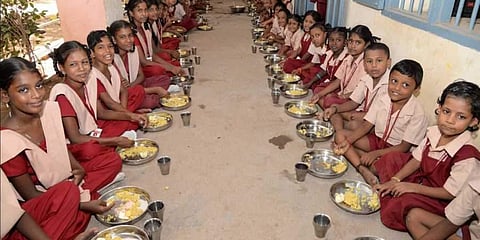

For many families, the mid-day meal is very important as parents can provide only one meal to their children, a new study has found. Over half the parents surveyed concurred with this, reiterating the relevance of the Bisi Oota scheme for a large number of children who face food insecurity, and for those who suffer from mild to moderate malnutrition.
Commissioned in 2016-17, the study by the Karnataka Evaluation Authority was released in January. It found that 2,14,500 children do not get breakfast at home. “This comprises 5.1% of the total children in government schools. In all, 52% of parents treat mid-day meals as a substantive meal as they can provide only one meal at home (5.1%),” the study stated.These findings assume more significance given that the mid-day meal scheme has been suspended since the lockdown was imposed, and for the past few months, has been replaced with supply of dry ration to children.
Researchers from the Hyderabad Karnataka Centre for Advanced Learning, Kalaburagi, who did the study for KEA, also referred to the scheme’s role in reduced anaemia in children. “There are 55 lakh children under the mid-day meal scheme. An Rashtriya Bal Swasthya Karyakram survey identified 10,685 children, or 0.19% of the total students, who had severe anaemia in 2017-18. This figure was reduced to 0.08 %in two years,” they said.
Milk at school is the first food for these students, the study said, pointing out that students valued milk more than meals for contribution to studies.“The study finds that the impact of milk is wholesome, very deep and intense. It is perceptible on enrolments at the secondary stage of schooling, as well as on retention and transition at lower primary school/higher primary school stages,” the researchers said.
They also recommended that the government provide millet-based food such as ragi balls, jowar roti and navane bisi bele bath two to three days a week, and customise it to regional food habits. They recommended giving vegetable-based (mineral) sweets twice a month, and huruli, hesaru kalu and kadale kalu as variants of pulses. At present, the education department is only permitted to provide dry ration kits to mid-day meal beneficiaries — rice/wheat and some pulses, but no milk powder, despite initial plans.
